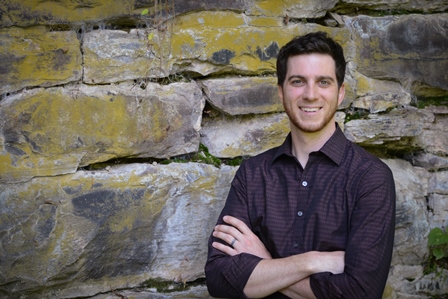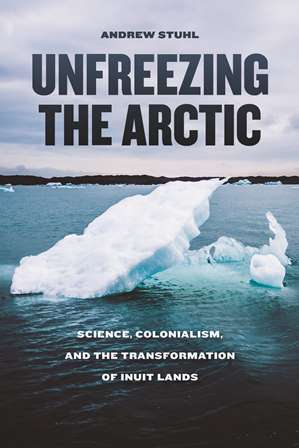SU Alumnus Explores Climate Change, Transformation in 'Unfreezing the Arctic'
 SALISBURY, MD---Dr. Andrew Stuhl, assistant professor of environmental humanities at Bucknell University, knows climate change is real. And he knows first-hand about the effects it has had in the Arctic.
SALISBURY, MD---Dr. Andrew Stuhl, assistant professor of environmental humanities at Bucknell University, knows climate change is real. And he knows first-hand about the effects it has had in the Arctic.
But are the changes occurring in that area in recent years really unprecedented? The short answer, he says, is “no.” The long answer is … complicated.
The Salisbury University alumnus examines the region’s history in his recent book, Unfreezing the Arctic: Science, Colonialism and the Transformation of Inuit Lands (University of Chicago Press).
Stuhl has had a lifelong interest in nature. He worked as an environmental educator for the Chesapeake Bay Foundation for two years after earning his B.S. in biology from SU in 2003. He then pursued his M.S. in land resources from the University of Wisconsin-Madison (UW-M), completing his thesis on the environmental history of oyster management.
He spent the next year volunteering with the Frontiers Foundation in Inuvik, Northwest Territories, Canada, providing educational resources for aboriginal and Inuit communities. This gave him a first-hand look at environmental conditions in the Arctic and provided opportunities for historical research.
He returned to Canada while researching his dissertation as a doctoral student at UW-M. Unfreezing the Arctic is based on that dissertation.
The book has earned praise from several of Stuhl’s peers nationally and internationally. Dr. Michael Bravo of the University of Cambridge, England, called it “a powerful and provocative antidote to current thinking about the Arctic,” adding he was “unafraid to make bold assertions.”
 Dr. Sverker Sörlin of Sweden’s KTH Royal Institute of Technology noted that it “does an important job in demonstrating how authority in Arctic science was always bound up with practice and politics,” calling it “an engaging volume [that] moves Arctic history writing strides forward.”
Dr. Sverker Sörlin of Sweden’s KTH Royal Institute of Technology noted that it “does an important job in demonstrating how authority in Arctic science was always bound up with practice and politics,” calling it “an engaging volume [that] moves Arctic history writing strides forward.”
Even before the book’s publication, Stuhl earned many of the scientific community’s highest accolades, including the National Science Foundation’s Integrated Graduate Education and Research Traineeship, the American Society for Environmental History’s prestigious Rachel Carson Prize, and the International Committee for the History of Technology’s Prize for Young Scholars.
Last spring, he was a Visiting Fulbright Research Chair at Carleton University in Ottawa, Ontario, Canada. There he researched indigenous treaty signings from the 1970s-2010s in Canada and Alaska, extrapolating information on how wildlife and fisheries agreements contained in the treaties may be useful in understanding environmental issues going forward.
More recently, he earned an award from the Fulbright Canada-Royal Bank of Canada Eco-Leadership Program that will allow him to install solar panels at Lewisburg Area Recreation Park and its community pool, near Bucknell.
Though his days as a Sea Gull are nearly a decade and a half behind him, Stuhl is quick to credit SU for starting him on the path that led to his current career, citing mentors including Drs. Heather Holmes, director of the Center for Student Achievement, and Mike Lewis, chair of the Environmental Studies Department.
“You get so much help from so many people for so long, and you carry those debts with you,” he said, adding that he tries to inspire his students the way SU’s faculty and staff inspired him.
In fact, it was Lewis who gave him his start as a published author and opened his eyes to the idea that history and the environment are intertwined. Before taking Lewis’ Environmental History class, Stuhl always had seen the study of the environment as a strictly scientific endeavor.
“It totally pulled back the curtain for me on nature and what environmental issues are all about,” he said. “It was mind blowing.”
In that class, Stuhl and his fellow students learned about nature’s influence on civilization — such as the location of many early settlements being based on access to fresh water, such as rivers and streams. For its capstone project, the class collectively researched and wrote a book about the history of the Wicomico River. Stuhl said he used much of the same methodology — conducting interviews and collecting archival materials — in writing Unfreezing the Arctic.
Salisbury gave him an opportunity to study nature first hand, not only due to its proximity to the Chesapeake Bay, but through New Student Orientation programs such as an annual canoe trip to Algonquin Provincial Park in Ontario, which he attended as a freshman and twice more as a peer leader. He also hiked portions of the Appalachian Trail as an SU student.
Most importantly, however, the University taught him to make well-rounded decisions by looking at things from multiple perspectives.
“It represents what SU is all about,” he said.
For more information call 410-543-6030 or visit the SU website at www.salisbury.edu.
